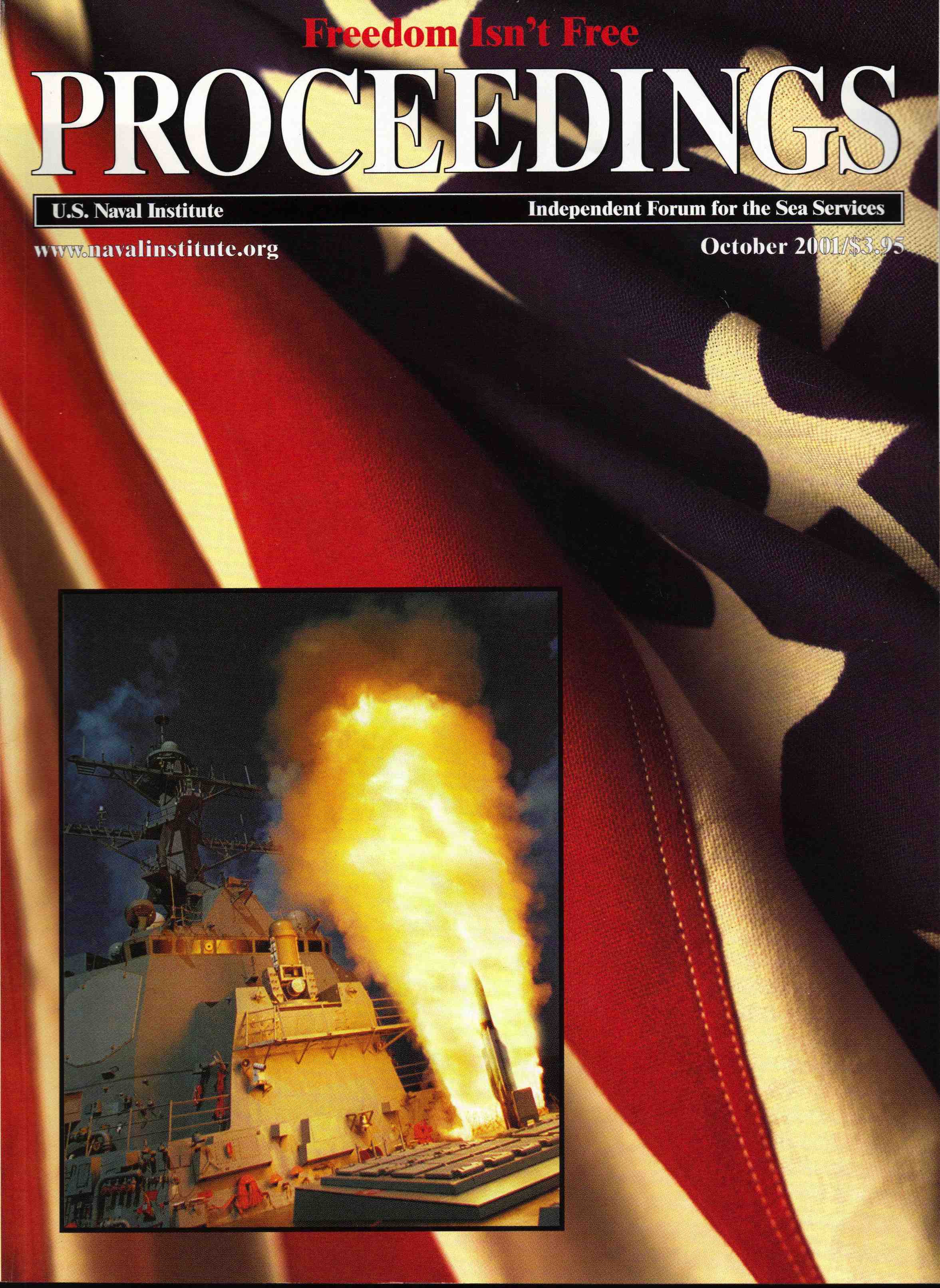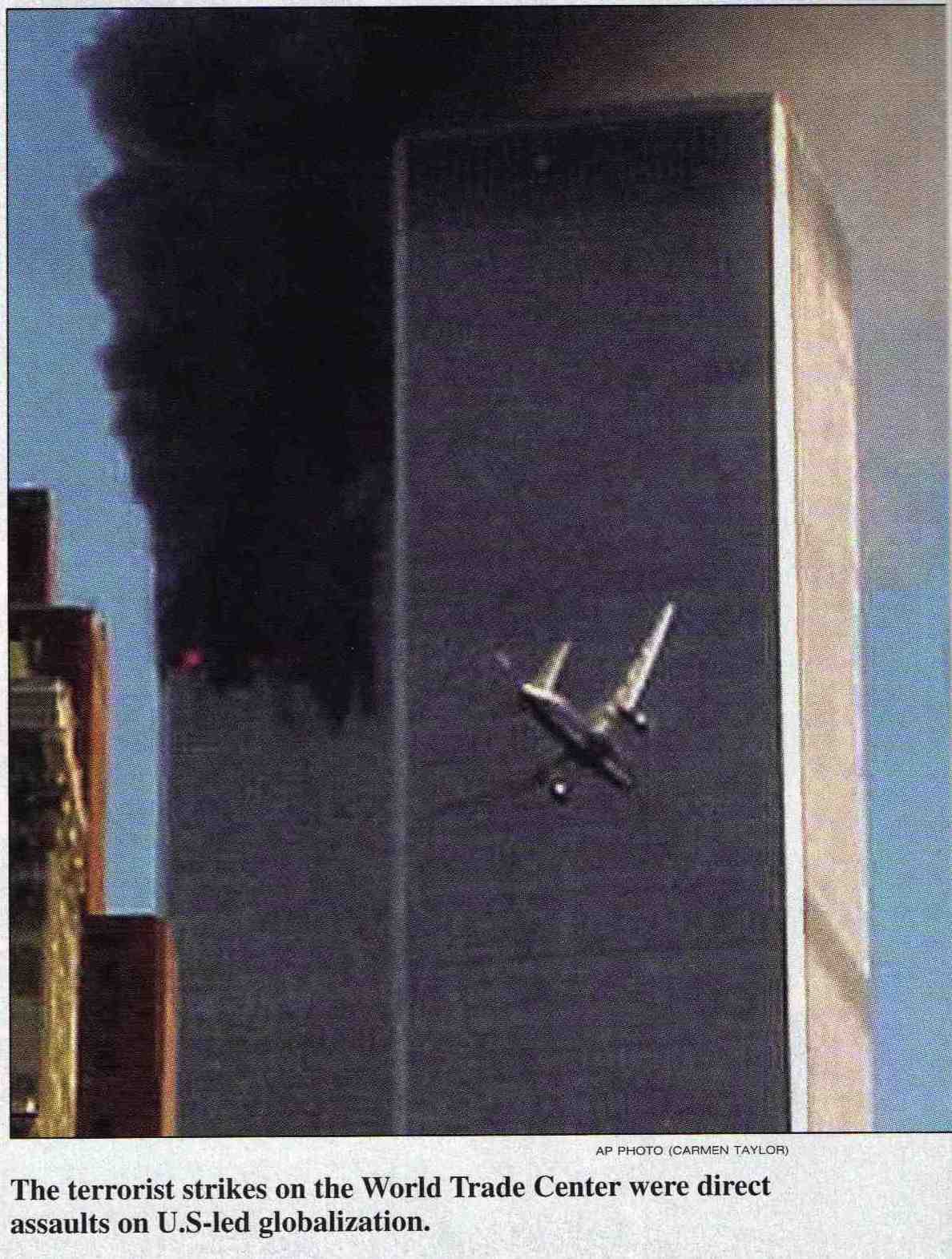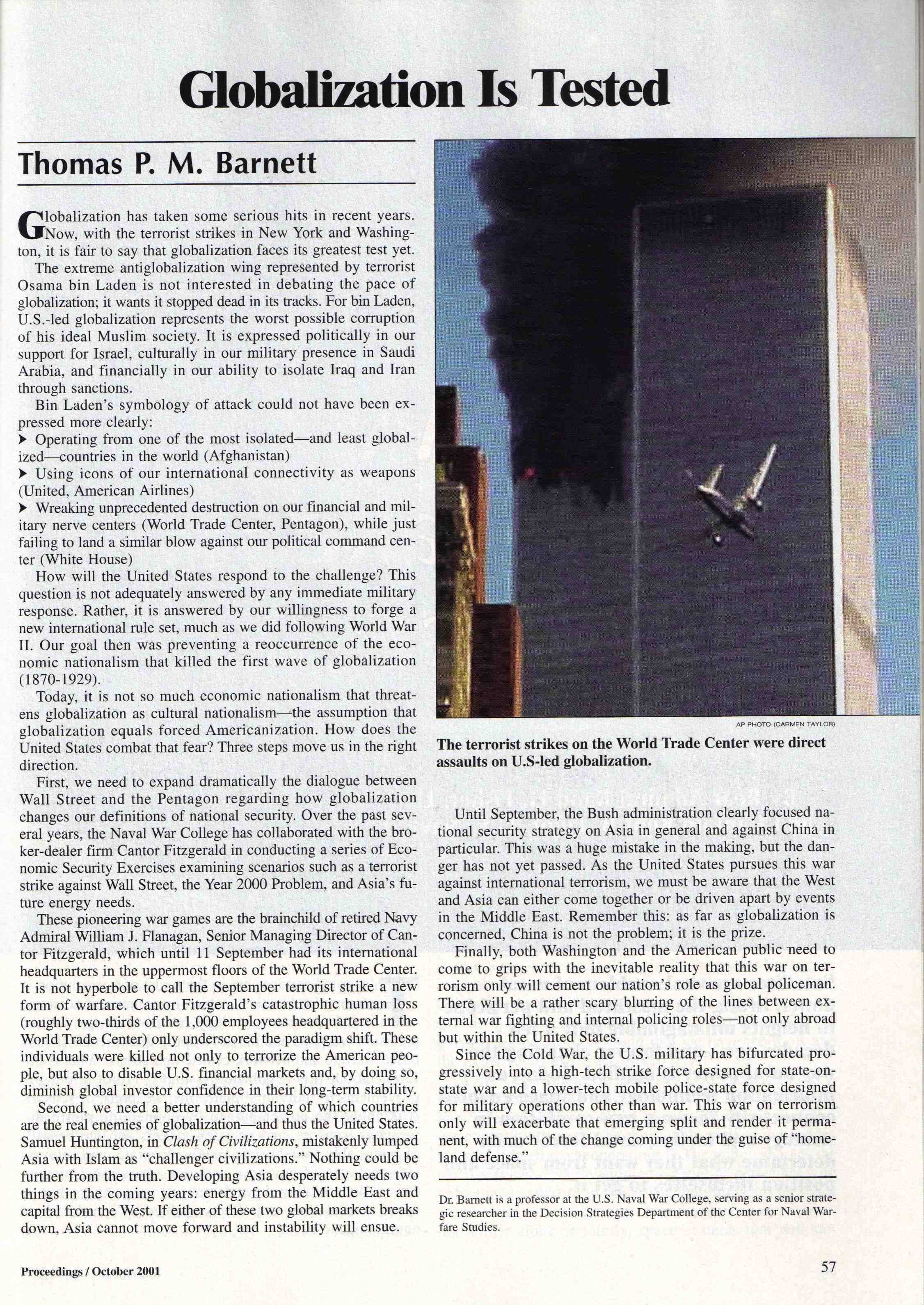Blast from my past: "Globalization is Tested" (2001)
 Saturday, August 7, 2010 at 2:15AM
Saturday, August 7, 2010 at 2:15AM 
"Globalization is Tested"
by
Thomas P.M. Barnett
COPYRIGHT: The U.S. Naval Institute, 2001 (October issue, p. 57); reprinted with permission

Globalization has taken some serious hits in recent years. Now, with the terrorist strikes in New York and Washington, it is fair to say that globalization faces its greatest test yet.
The extreme antiglobalization wing represented by terrorist Osama bin Laden is not interested in debating the pace of globalization; it wants it stopped dead in its tracks. For bin Laden, U.S.-led globalization represents the worst possible corruption of his ideal Muslim society. It is expressed politically in our support for Israel, culturally in our military presence in Saudi Arabia, and financially in our ability to isolate Iraq and Iran through sanctions.
Bin Laden's symbology of attack could not have been expressed more clearly:
- Operating from one of the most isolated--and least globalized--countries in the world (Afghanistan)
- Using icons of our international connectivity as weapons (United, American Airlines)
- Wreaking unprecedented destruction on our financial and military nerve centers (World Trade Center, Pentagon), while just failing to land a similar blow against our political command center (White House).
How will the United States respond to the challenge? This question is not adequately answered by any immediate military response. Rather, it is answered by our willingness to forge a new international rule set, much as we did following World War II. Our goal then was preventing a reoccurrence of the economic nationalism that killed the first wave of globalization (1870-1929).
Today, it is not so much economic nationalism that threatens globalization as cultural nationalism--the assumption that globalization equal forced Americanization. How does the United States combat that fear? Three steps move us in the right direction.
First, we need to expand dramatically the dialogue between Wall Street and the Pentagon regarding how globalization changes our definitions of national security. Over the past several years, the Naval War College has collaborated with the broker-dealer firm Cantor Fitzgerald in conducting a series of Economic Security Exercises examining scenarios such as a terrorist strike against Wall Street, the Year 2000 Problem, and Asia's future energy needs.
These pioneering wargames are the brainchild of retired Navy Admiral William J. Flanagan, Senior Managing Director of Cantor Fitzgerald, which until 11 September had its international headquarters in the uppermost floors of the World Trade Center. It is not hyperbole to call the September terrorist strike a new form of warfare. Cantor Fitzgerald's catastrophic human loss (roughly two-thirds of the 1,000 employees headquartered in the World Trade Center) only underscored the paradigm shift. These individuals were killed not only to terrorize the American people, but also to disable U.S. financial markets and, by doing so, diminish global investor confidence in their long-term stability.
Second, we need a better understanding of which countries are the real enemies of globalization--and thus the United States. Samuel Huntington, in Clash of Civilizations, mistakenly lumped Asia with Islam as "challenger civilizations." Nothing could be further from the truth. Developing Asia desperately needs two things in the coming years: energy from the Middle East and capital from the West. If either of these two global markets breaks down, Asia cannot move forward and instability will ensue.
Until September, the Bush administration clearly focused national security strategy on Asia in general and China in particular. This was a huge mistake in the making, but the danger has not yet passed. As the United States pursues this war against international terrorism, we must be aware that the West and Asia can either come together or be driven apart by events in the Middle East. Remember this: as far as globalization is concerned, China is not the problem; it is the prize.
Finally, both Washington and the American public need to come to grips with the inevitable reality that this war on terrorism only will cement our nation's role as global policeman. There will be a rather scary blurring of the lines between external war fighting and internal policing roles--not only abroad but within the United States.
Since the Cold War, the U.S. military has bifurcated progressively into a high-tech strike force designed for state-on-state war and a lower-tech mobile police-state forces designed for military operations other than war. This war on terrorism only will exacerbate that emerging split and render it permanent, with much of the change coming under the guise of "homeland defense."
Dr. Barnett is a professor at the U.S. Naval War College, serving as a senior strategic researcher in the Decision Strategies Department of the Center for Naval Warfare Studies.











Reader Comments (3)
These reminders are very important to the public that only sees either/or oversimplified TV debates. It would be nice if vocal CD readings of these 'Blasts' were available for those folks, or at least a web site with vocal presentation, with some pictures, for the younger geek generation that is also trying to deal with this long term and complex situation. They might then share the experience with older folks. If our efforts are to succeed we will probably need a wide public insight and feeling of participation so we can take the punches and neither fold nor overreact emotionally.
Tom, thanks for these posts, it's great to go back and have a re-examination of what we were thinking post these events.
The reactive violence demonstrated by AQ etc is still one of the most confusing things to many laymen. I still often find myself trying to explain, “Why they hate us so much”. One of the most effective explanations that I can give is the globalisation as corrupter argument that you so often put forward.
The posted article is a nice condensation of that argument. What I find myself wondering this morning is how far we have cone since the dark days of 9/11 in terms of actually changing the minds of those that oppose globalisations advance on the grounds that it represents the most corrupting and potentially damaging thought pattern.
Watching the news out of Pakistan with my family I thought to myself that each natural disaster that strikes a disaffected portion of the world, especially those areas that are increasingly hostile to the advances offered by globalisation, and Pakistan’s increasingly militant and fundamentalist mindset is a major player there, represents another chance for the US and connected player to rewrite the conspiracy theories that the CIA and the US led banks are out to cut the world and make profits off the blood flow.
Certainly donor fatigue is a factor, but the more we make an effort to support and assist those in need the better we are able to counter the arguments that globalisation represents the most rapacious version of free market economics.
Hi,
Its funny...but just when I was feeling depressed about the whole situation and was growing foggy on my views...re- reading your post brought it back to clarity....you made my day..
thanks,
Sue